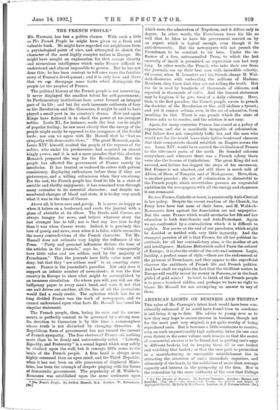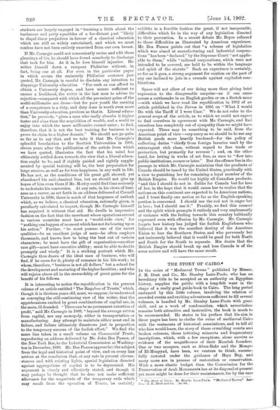AMERICAN LIGHTS ON BUSINESS AND TRUSTS. 4 THE value of Mr.
Carnegie's latest book would have been con- siderably enhanced if he could have found time to condense it and bring it up to date. His advice to young men as to how they may hope to secure success in business, though not for the most part very original, is yet quite worthy of being reproduced once. But it becomes a little wearisome to receive, even on such unquestionably high authority, twice (in one case even thrice) in the same volume such lessons as that the secret of commercial success is to be found, not in putting one's eggs in different baskets, but in keeping them all in one basket and watching that basket ; or that the sure path to promotion in a manufacturing or mercantile establishment lies in attracting the attention of one's immediate superiors, and ultimately of the heads, by the exhibition of more than average capacity and interest in the prosperity of the firm. Nor is the reiteration by the same authority of the view that College
— —
• (1.) The Empire of Balthus+. By Andrew Carnegie. London : Harper and BrothIrs. 1109. 6d.1—(2.) Commercial frosts: the Growth and Eights of Aggregated Capital. By John B. Dos Passos. London : G. P. Putnam 's Bons. Ps.
students are largely engaged in "learning a little about the barbarous and petty squabbles of a far-distant past "likely to dispel thoie prejudices in favour of a classical education which are still so widely entertained, and which we must confess have not been entirely exorcised from our own breast.
If Mr. Carnegie could not conveniently revise and edit these gleanings of his, he should have found somebody to discharge that task for him. As it is, he does himself injustice. He writes himself down a rampant Philistine without, in fact, being one at all. For even in the particular paper in which occurs the eminently Philistine sentence just quoted, Mr. Carnegie is careful to disclaim any intention to disparage University education. "For such as can afford to obtain a University degree, and have means sufficient to ensure a livelihood, the writer is the last man to advise its rejection—compared with which all the pecuniary gains of the multi-millionaire are dross—but for poor youth the earning of a competence is a duty, and duty done is worth even more than University education, precious as that is. Liberal educa- tion," he proceeds, "gives a man who really absorbs it higher tastes and aims than the acquisition of wealth, and a world to enjoy into which the mere millionaire cannot enter ; to find, therefore, that it is not the best training for business is to prove its claim to a higher domain." We should not go quite so far as to say that, and we take it that Mr. Carnegie's splendid benefaction to the Scottish Universities in 1901, eleven years after the publication of the article from which we have quoted, illustrates the fact that his mind has ultimately settled down towards the view that a liberal educa- tion ought to be, and if rightly guided and rightly supple- mented by special training will be, the best preparation for large success, as well as for true happiness, in any walk in life. He has not, as the conditions of his great gift showed, yet abandoned his anti-classical bias, but we should not give up hopes of him even there if Mr. Morley could find time seriously to undertake his conversion. At any rate, in his views of busi- ness as a career, as set forth in an address delivered at Cornell University in 1896, there is much of that largeness of outlook which, as we believe, a classical education, rationally given, is peculiarly calculated to impart, though Mr. Carnegie himself has acquired it without that aid. He dwells in impressive fashion on the fact that the merchant whose operations extend to various countries must have a "world-wide view," for "nothing can happen of moment which has not its bearing upon his action." Further, "he must possess one of the rarest qualities—be an excellent judge of men—he often employs thousands, and knows how to bring the best out of various characters; he must have the gift of organisation—another rare gift—must have executive ability ; must be able to decide promptly and wisely." It is a striking portrait which Mr. Carnegie thus draws of the ideal man of business, who will find, if he cares for it, plenty of romance in his life-work ; to whom, therefore, "business is not all dollars," but a school for the development and maturing of the higher faculties ; and who will rejoice above all in the stewardship of great gains for the benefit of his fellows.
It is interesting to notice the republication in the present volume of an article entitled" The Bugaboo of Trusts," which, though it is thirteen years old, must, we suppose, be uuden3tood as conveying the still-continuing view of the writer, that the apprehensions excited by great combinations of capital are, in the main, ill-founded. " Therecan be no permanent extortion of profit," said Mr. Carnegie in 1889, "beyond the average return from capital, nor any monopoly, either in transportation or manufacturing. Any attempt to maintain either must end in failure, and failure ultimately disastrous just in proportion to the temporary success of the foolish effort." We find the same line taken in a small volume on Commercial Trusts, reproducing an address delivered by Mr. John Dos Passos, of the New York Bar, to the Industrial Commission at Washing- ton in December, 1899. Mr. Dos Passos approachez the subject from the legal and historical point of view, and on every line arrives at the conclusion that, at any rate in present circum- stances and with existing lights, special legislation directed against aggregations of capital is to be deprecated. His argument is clearly and effectively stated, and though it may perhaps be thought that he does not make sufficient allowance for the magnitude of the temporary evils which may result from the operation of Trusts, he certainly exhibits in a forcible fashion the great, if not insuperable, difficulties which lie in the way of any legislation directed. to their prevention. In a recent debate Mr. Bryce referred to those difficulties as illustrated by American experience. Mr. Dos Passos points out that "a scheme of legislation which was aimed at manufacturing and industrial corpora- tions "has been " declared " by the Supreme Court "not applic- able to them," while "railroad corporations, which were not intended to be covered, are held to be within the language and spirit of the statute." Such an experience is certainly, so far as it goes, a strong argument for caution on the part of any one inclined to join in a crusade against capitalist com- binations.
Space will not allow of our doing more than giving brief expression to the disagreeable surprise—as if one came across a rattlesnake in an English garden or on a Scotch moor —with which we have read the republication in 1902 of an article published in the Forum in 1895 on "What I would Do with the Tariff if I were Czar." We do not refer to the. general scope of the article, as to which we could not expect- to find ourselves in agreement with Mr. Carnegie, and find ourselves less completely out of sympathy than we might have expected. There may be something to be said, from the American point of view—very sorry as we should be to see any British goods more heavily burdened—for the policy of collecting duties "chiefly from foreign luxuries used by the extravagant rich class, without regard to free trade or protection, but primarily for revenue " ; and, on the other hand, for letting in works of art free, as sure to "flow into. public institutions, sooner or later." But the offence lies in the passage in which Mr. Carnegie maintains that the products of Canada should be taxed by the United States, practically with a view to punishing her for remaining a loyal member of the British Empire. He would tax highly all Canadian products, "and this I should do not in dislike for Canada but for love of her, in the hope that it would cause her to realise that the nations on this continent are expected to be American nations, and I trust finally one nation so far as the English-speaking portion is concerned. I should use the rod not in anger but in love ; but I should use it." Frankly, we find this counsel. and the spirit which prompts it entirely and very unpleasantly at variance with the feeling towards this country habitually expressed even with effusion by Mr. Carnegie. Mr. Carnegie. forgets how history has judged the foolish Englishmen who believed that it was the manifest destiny of the American Union to lose the Southern States, and who perversely but not insincerely believed that it would be good for both North and South for the South to separate. His desire that the British Empire should break up and lose Canada is of the same nature and will have the same result.











































 Previous page
Previous page